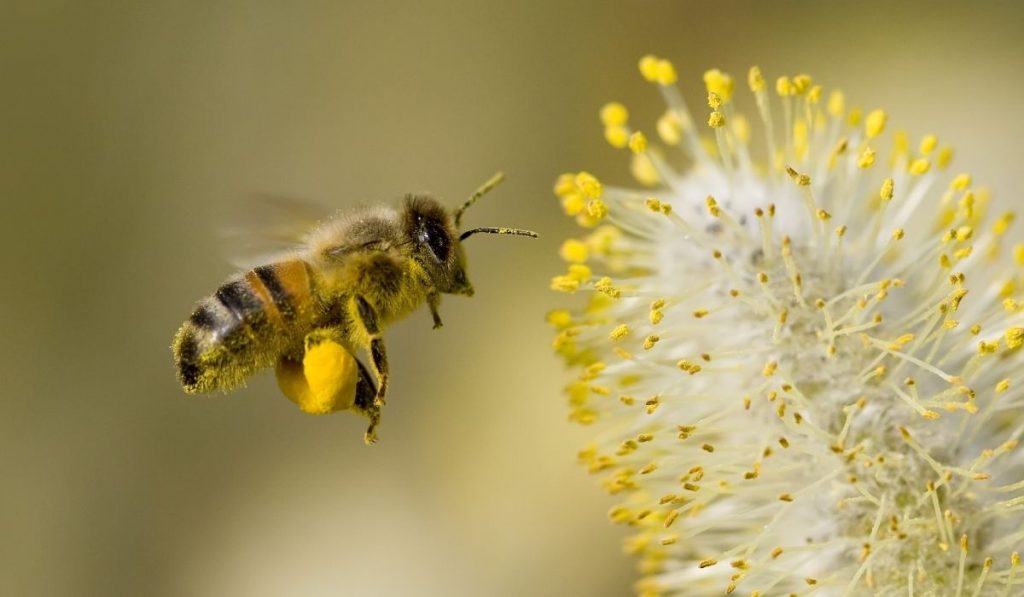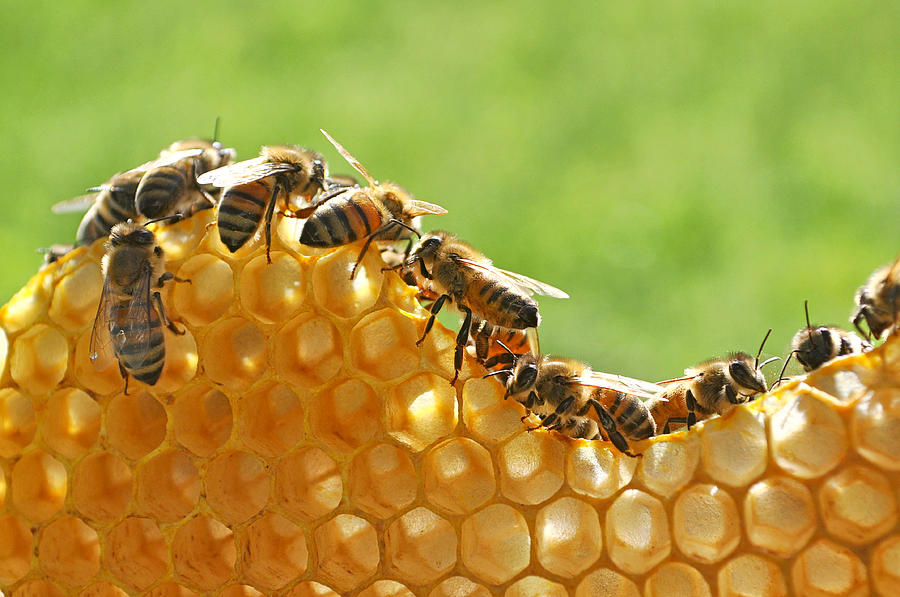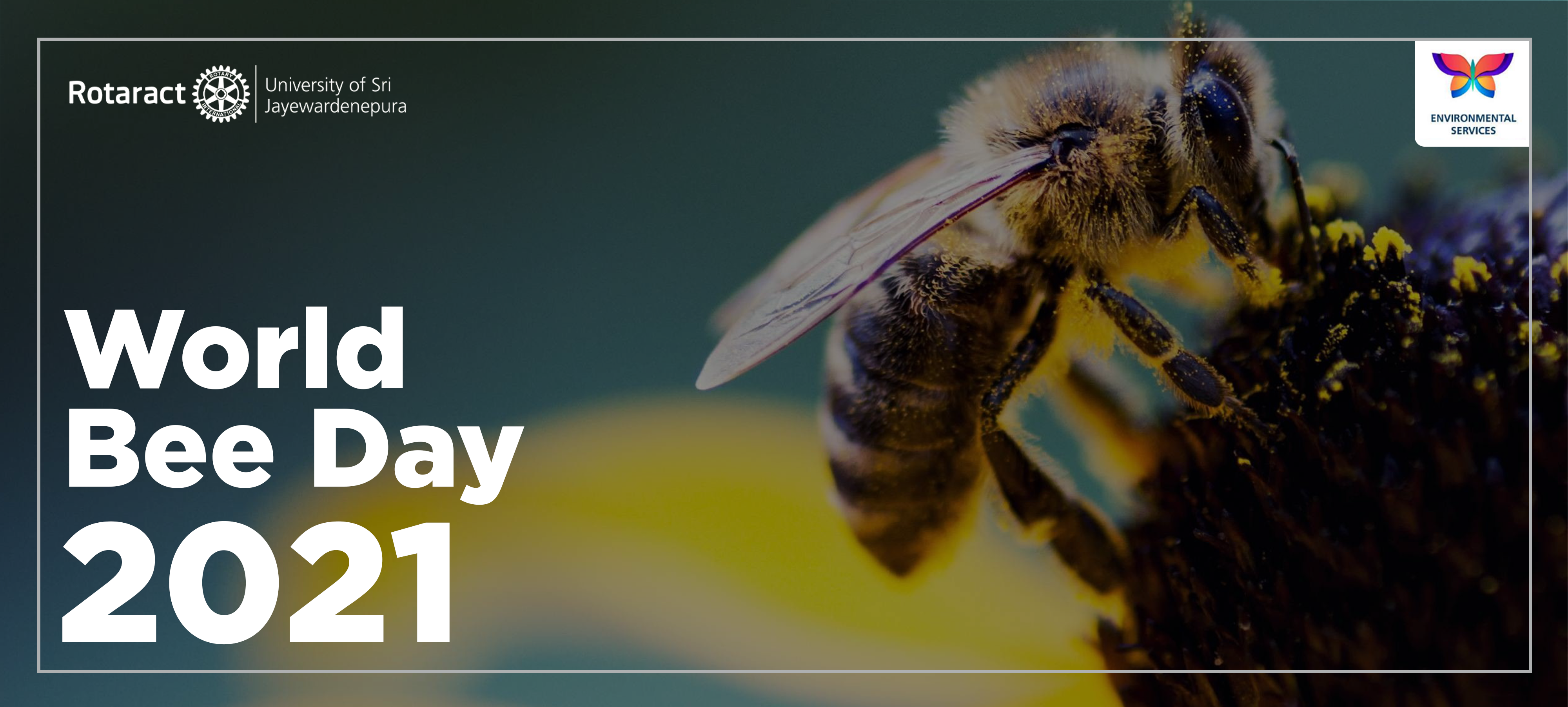The Environmental Service Avenue of the Rotaract Club of University of Sri Jayewardenepura, with immense pride, has launched its inaugural Article Series to acknowledge prominent days pertaining to the environment. The sixth step was taken to showcase The World Bee Day 2021.
“The men of experiment are like the ant; they only collect and use. But the bee…gathers its materials from the flowers of the garden and of the field, but transforms and digests it by a power of its own.”
-Leonardo da Vinci-
Who are Bees?
Bees; a natural wonder of a busy world led by a Queen of their own are considered as the busiest insects among 900 thousand different kinds of insect species on Earth. The amount of work and energy driven by these tiny yellow stripped creatures from mornings to day and night is quite unnoticeable but highly dominant as a key role in ecosystems since the early stages of life. In 2020 2 Billion bees were actively engaging and contributing to our ecosystem.
The contribution by tiny bees and other pollinators to the environment is complex and pretty vital for the interconnection of ecosystems for the survival and co-existence of different species. Hence, the tiny communities of Bees and other pollinators highly contribute to the existence and development of bio diversity.
Why does the World need a Bee Day?
What do you think about bees? You might hate them or love them, but do you know that even if you hate bees, you need them. Bees perform a task that is vital to the survival of agriculture. In fact, one third of our global food supply is pollinated by bees. The greatest contribution of bees and other pollinators is the pollination of nearly three quarters of the plants that produce 90% of the world’s food.
A third of the world’s food production depends on bees. Every third spoonful of food depends on pollination. They are important for the food production of all the other animals and birds in the forest ecosystem dependent on it for food berries, seeds and fruits.
In 2017, Anton Janša, the pioneer of beekeeping took an initiative to manifest the importance of bees and other pollinators to the United Nations. Later in the year UN declared May 20th as the World Bee Day. The main purpose of the World Bee Day events is to spread awareness of the significance of bees and other pollinators for the survival of humans and other living beings and to dissolve threats to them to strengthen the world food supply leading to ultimate elimination of the threats of hunger in developing countries.

Bees are disappearing,
If all the world’s bees die, that would be the end of the human beings. The use of pesticides in agriculture has increased exponentially at the present. Relatedly, it is now suggested that the widespread use of pesticides known as neonicotinoids is having a detrimental impact on the health of bees. These pesticides directly contribute to a phenomenon known as Colony Collapse Disorder (CCD). CCD is essentially the process where honeybees spontaneously abandon their hives. When bees are exposed to pesticides like neonicotinoids, they go insane and don’t know how to return home. It’s almost as if they are given a form of Alzheimer’s.
It’s important to know that pesticides are a main reason why the bees are dying, but there are other factors as well. Impact of human practices and the ongoing problems in climate change, environmental degradation and pollution, alarms the rate of bee deaths.
The fourth consecutive celebration of World Bee Day is set upon 2021 with the theme of “Bee engaged – Build Back Better for Bees”. It would be held virtually by the Food and Agriculture Organization of the United Nations This would be a great opportunity to raise awareness of how everyone around the globe can make a difference to support, restore and enhance the role of pollinators.
Let us hold hands to protect the community of Bees on the 20th of May 2021 and join the virtual conversations by the UN and create a change on social media using the hashtags #WorldBeeDay #Savethebees!

එක්සත් ජාතීන්ගේ සංවිධානය විසින් ලෝක මී මැසි දිනය මැයි මස 20 දින සැමරීමට යොදා ඇත්තේ මීමැසි පාලනයේ ආරම්භකයෙකු වන ඇන්ටන් ජැන්සාගේ උපන් දිනය ද එදිනට යෙදී ඇති හෙයිනි.එමෙන්ම මෙම ජාත්යන්තර දිනයේ අරමුණ වන්නේ පරිසර පද්ධතිය සඳහා මී මැස්සන් සහ අනෙකුත් පරාග කාරකයන්ගේ කාර්යභාරය අගය කිරීම හා ඔවුන් ආරක්ෂා කිරීම සඳහා පියවර ගැනීම යි.
ඉතා කුඩා කෘමි විශේෂයක් වන මෙම මී මැස්සන් වර්ග 20,000ක් පමණ ලෝකයේ ජීවත්වන බව කෘමි විශේෂඥයින්ගේ අදහසයි. ලෝකයට මොවුන් කෙතරම් වැදගත්ද යන්න ඇල්බට් අයින්ස්ටයින් විද්වතාගේ පහත ප්රකාශයෙන් අවබෝධ කර ගත හැකිය.
“මී මැස්සන් පොළොවෙන් අතුරුදහන් වුවහොත් මිනිසාට ජීවත් වීමට ඇත්තේ වසර හතරක් පමණි”
ලොව පුරා පරාගන කාර්යයේදී මී මැස්සන් මගින් විශාල කාර්ය භාරයක් සිදුවන අතර පරාගණය අපගේ පරිසර පද්ධතිවල පැවැත්ම සඳහා අවශ්ය මූලික ක්රියාවලියකි. ලෝකයේ සපුෂ්ප ශාක විශේෂවලින් 90% කට ආසන්න ප්රමාණයක් මුළුමනින්ම හෝ අර්ධ වශයෙන් සත්ව පරාගණය මත රඳා පවතින අතර පරාග වාහකයන් ආහාර සුරක්ෂිතතාවයට සෘජුවම දායක වනවා පමණක් නොව, ජෛව විවිධත්වය සංරක්ෂණය කිරීම සඳහා ද දායක වේ,මී මැස්සන් මේ අතරින් ප්රමුඛත්වය ගනියි.මී
2021 වසරේ ලෝක මී මැසි දිනය සැමරීම තවමත් පවතින වසංගතය මධ්යයේ මාර්ගගත ක්රමයට “Bee engaged; build back better for bees” යන තේමාව යටතේ සමරනු ලැබේ. COVID-19 වසංගතයෙන් ආහාර සුරක්ෂිතතාව සහ කෘෂිකාර්මික ජීවනෝපායන් සඳහා ඇති වන තර්ජනවලට එරෙහිව පාරිසරික පුනර්ජනනය හා පරාග වාහක ආරක්ෂාව සඳහා ප්රමුඛතාවය ලබා දීම සඳහා ගෝලීය සහයෝගීතාව මෙම අවස්ථාවෙන් ඉල්ලා සිටියි. පරාග වාහකයන්ගේ භූමිකාවට සහාය වීම, ප්රතිෂ්ඨාපනය කිරීම සහ වැඩි දියුණු කිරීම සඳහා සෑම කෙනෙකුටම වෙනසක් කළ හැකි ආකාරය පිළිබඳ දැනුවත් කිරීමේ අවස්ථාවක් මෙමගින් නිර්මාණය කරනු ඇත.
කෙසේ වෙතත් මෙය කියවන පාඨක ඔබ ද මීමැස්සන් ආරක්ෂා කරගැනීම සඳහා පහත දැක්වෙන සරල ක්රියාමාර්ග අනුගමනය කරන්නේ නම් එය ඔවුන් ආරක්ෂා කිරීම සඳහා මහගු දායකත්වයක් වනු ඇත.
- රසායනික පොහොර හා කෘත්රිම පළිබෝධ නාශක භාවිතය අවම කරන්න
- මී මැස්සන් සදහා අහිතකර ඇකේෂියා වැනි ශාක හැකිතාක් අවම කරන්න
- ශාක පද්ධතිය ආරක්ෂා කරන්න
- මී මැසි ජනපද විනාශ කිරීමෙන් වළකින්න
- ඔබගේ ගෙවත්තේ මල් පිපෙන ශාක සිටුවන්න
මානව බලපෑම් හේතුවෙන් මී මැස්සන් විශේෂ වඳවීමේ අනුපාතය සාමාන්යයට වඩා 100 සිට 1,000 ගුණයකින් වැඩි වී ඇත. අපෘෂ්ඨවංශී පරාග කාරකයන්ගෙන් සියයට 35 කට ආසන්න ප්රමාණයක්, විශේෂයෙන් මීමැස්සන් , සමනලුන් සහ වවුලන් වැනි පෘෂ්ඨවංශී පරාග කාරකයන්ගෙන් සියයට 17 ක් පමණ ගෝලීය වශයෙන් වඳ වී යෑමට මුහුණ දෙති.
මෙම ප්රවණතාවය දිගටම පැවතුනහොත්, පලතුරු, ඇට වර්ග සහ බොහෝ එළවළු භෝග වැනි පෝෂ්යදායී බෝග වලට වැඩි වශයෙන් ආදේශ කරනු ලබන්නේ සහල්, ඉරිඟු සහ අර්තාපල් වැනි ප්රධාන භෝගයන් වන අතර අවසානයේදී අසමතුලිත ආහාර වේලක් ලැබෙනු ඇත. දැඩි ගොවිතැන් ක්රම, ඉඩම් පරිහරණ වෙනස් කිරීම, මොනෝ-බෝග වගාව, පළිබෝධනාශක සහ දේශගුණික විපර්යාස සමඟ සම්බන්ධ ඉහළ උෂ්ණත්වය යන සියල්ලම මී මැසි ජනගහනයට ගැටළු ඇති කරයි, එබැවින් මී මැස්සන් සදහා වෙන් වූ දින පමණක් නොව සෑම දිනකම මී මැස්සන් රැකගැනීමට ක්රියා කිරීම මානව අපගේ යුතුකමක් හා වගකීමක් වේ
Written by Rtr. Shermila Dewapurage & Rtr. Ishini Suriyarachchi



0 Comments